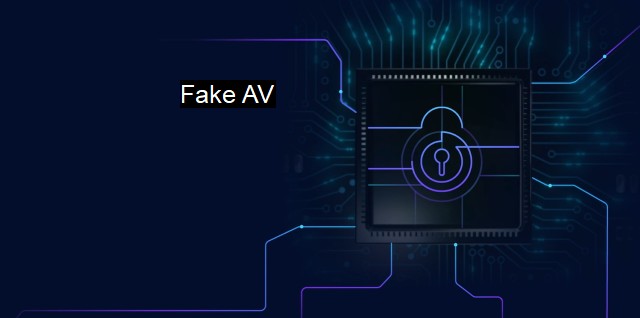What is Fake AV?
Combatting the Threat of Fake Antivirus (Fake AV) - Understanding the Malware and its Ongoing Operational Threats to Cybersecurity for Businesses and Individuals
A key term you may encounter in the world of cybersecurity and antivirus is "Fake AV," standing for Fake AntiVirus. It is a kind of interactive malware, also known as scareware, characterized by its deceptive pretense of being a legitimate antivirus software package.Fake AV operates on a poignantly offensive, rather than defensive or passive strategy to breach cybersecurity measures. Cybercriminals employ fake antivirus software to incite fear, manipulate users, and engage them in a harmful interaction with their computer systems.
The process of Fake AV typically starts with incessant, intrusive alerts conveying the false message that the user's computer system is at risk due to virus infections. Accentuating the perceived threat, some fake antivirus alerts even display fraudulent system scans, stopwatch timers, flashing indicators, and an elaborate list of non-existent malware purportedly invading the user's computer, to provoke immediate action.
These aggressive, impacting scare tactics are intended to urge users towards a resolution offered by the same Fake AV software itself. The solutions eggs on users to download, install, or pay for antivirus software which supposedly detects and cleans up the virus from their system. Unfortunately, the proposed software is neither relevant, authentic nor beneficial but instead imposes a considerable risk itself.
Mindfully observant users would note the alarmist tone of the dialogue box messages used by Fake AV, coupled with the eager intention of selling something as red flags indicative of the fraud. Authentic antivirus software provides calculated measures to contain and deal with threats and rarely, if ever, urges users to part with money "for immediate action."
Interacting with Fake AV pop-ups, irrespective of whether scanners do or don’t accept their demands, becomes the gateway to accessing the system. Therefore, Fake AV pop-ups may be regarded as hostile phishing attacks, prompting users' interaction to invade the system, much unlike other undetectable malware strategies.
Aside from their scare function, Fake AV poses not only financial risks due to the transactions they suggest but can actively further compromise the security of the user's system. Some variations may deliver additional unwanted software, advertisements or even severe forms of malware like ransomware or trackers capable of gathering sensitive personal data.
The personas criminally administering Fake AV are often sophisticated, professional cyber criminals with a methodical approach, used extensively to swindle masses. Hence the scope of Fake AV is widespread and includes both individual users and organizational networks.
Mitigating Fake AV necessitates a responsible, mindful approach to online interactions, including not engaging with, downloading, or acknowledging unknown software proposed via online alerts. A critical measure lies in employing bona fide antivirus software familiar to the user. keeping software and systems updated, using ad blockers and anti-malware tools, actively operating firewalls in a productive manner can all significantly limit any potential Fake AV exposure.
Fake AV stands among the pressing cyber threats globally by employing tactful, malign strategies to infiltrate cyber networks. Awareness about its existence, recognition of its indicators, and adoption of proactive protective behaviors may significantly avoid most potent threats presented by this cyber enemy.

Fake AV FAQs
What is Fake AV?
Fake AV or Fake Antivirus is a type of malware that disguises itself as a legitimate antivirus software. It tricks users into buying a fake security software by showing false and exaggerated reports of computer infections.How does Fake AV infect my computer?
Fake AV can infect your computer through various methods such as spam emails, malicious websites, and software downloads. It can also be bundled with other software programs or installed by a Trojan.What are the consequences of installing Fake AV?
Installing Fake AV can lead to severe consequences such as compromising your data and personal information, slowing down your computer, and making it vulnerable to other malware attacks. Moreover, it can cause financial loss if you have purchased the fake security software.How can I protect myself from Fake AV?
You can protect yourself from Fake AV by keeping your antivirus software up-to-date, avoiding suspicious emails and websites, not clicking on pop-ups or ads, and being cautious while downloading software from the internet. It is also recommended to back up your data regularly and use a reliable antimalware software.| | A | | | B | | | C | | | D | | | E | | | F | | | G | | | H | | | I | | | J | | | K | | | L | | | M | |
| | N | | | O | | | P | | | Q | | | R | | | S | | | T | | | U | | | V | | | W | | | X | | | Y | | | Z | |
| | 1 | | | 2 | | | 3 | | | 4 | | | 7 | | | 8 | | |||||||